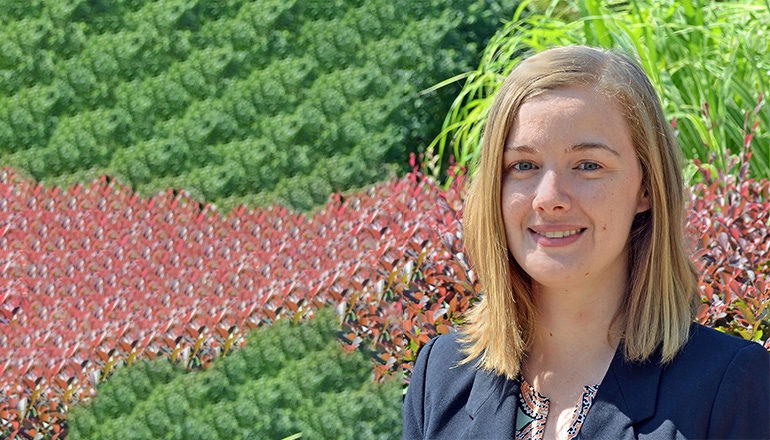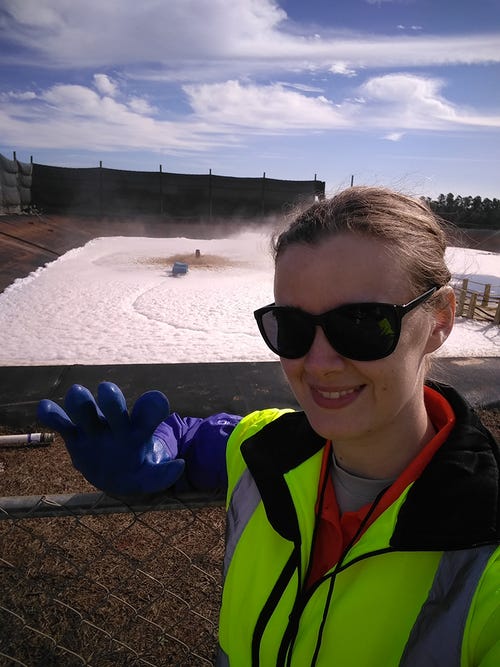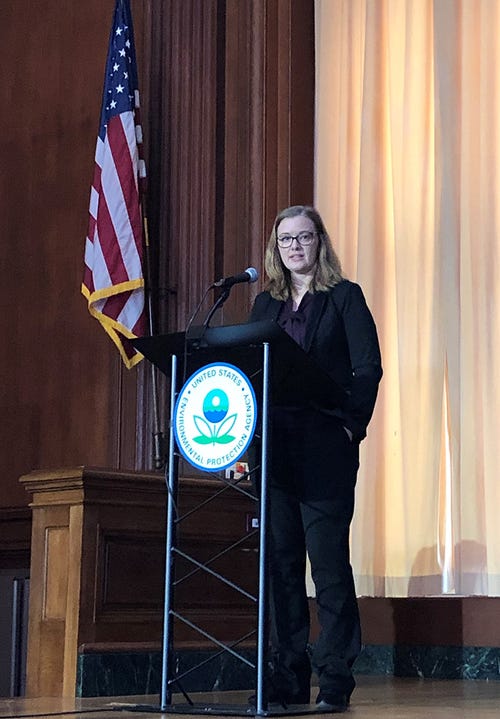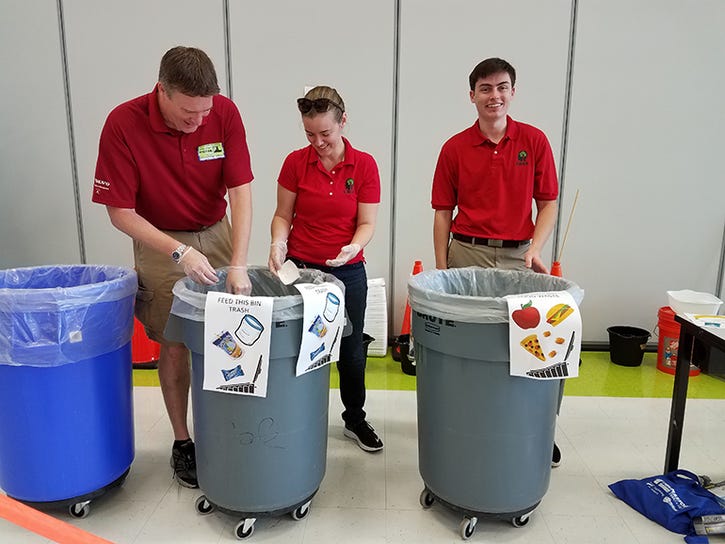Debra Kantner, a 2020 Waste360 40 Under 40 award recipient, discusses her work with EREF’s Data & Policy Program and some of her most interesting research findings.

For eight years, Debra Kantner has worked hard to conduct research and collect data that has been valuable to the waste and recycling industry. Through the Environmental Research & Education Foundation’s (EREF) Data & Policy Program, which she established early in her career, she has researched how recycling is defined and measured, how landfill tip fees have changed year-over-year, how the industry can improve sustainability and more.
Kantner began her career at EREF as an intern and worked her way up to her current role as director of sustainability. In this position, she is challenged with connecting the dots between product manufacturers and the packaging/residuals that ultimately become managed waste.
“Debra has a number of admirable attributes, but if I had to pick one, it would be her intellectual curiosity,” says EREF President and CEO Bryan Staley. “This trait leads her to want to know every in and out of a particular issue, which ultimately makes her a highly knowledgeable expert on the topic. It's this trait that also makes her engaging to listen to when she speaks at conferences because it allows her to share more interesting, deep-dive information than is typically shared. Lastly, this attribute conveys that her work is not just a career path; it's her passion.”
The 2020 Waste360 40 Under 40 award recipient recently sat down with us to discuss her work with EREF’s Data & Policy Program, some of her most interesting research findings and how she’s seen the industry change over the years.
Waste360: What drew you to the waste and recycling industry?
Debra Kantner: What drew me to the industry is the fact that it’s complex and multifaceted. My background is in environmental engineering and the waste industry, so from an engineering perspective, it’s a fun industry to be a part of.
This industry is very complex because it has to deal with public-facing community outreach and figuring out the best way to communicate and educate residents about how to make the best decisions with their materials. It also has to deal with landfills and recycling systems, which makes it more complex than other industries I had considered working in.
I really love that extra challenge and extra perspective that comes with the complexity of this industry.

Waste360: Tell us about your role as director of sustainability at EREF and the roles you held prior to being promoted to this role.
Debra Kantner: The sustainability director position is pretty new at EREF, and it was basically born out of the growing focus on sustainable materials management (SMM).
With a lot of the research and data we’ve collected at EREF, we know there are certain decisions we can make within the industry to improve sustainability, such as how we manage landfill gas or how we route our vehicles. But at the same time, we don’t have control of what’s entering the waste stream; that’s dependent on the products and packaging being manufactured.
What’s most exciting about this new role is that I get to focus on the data and research and conversations that we need to have to really move the needle on sustainability and to help inform the decisions that product and packaging manufacturers are making about what’s going into the waste stream.
Prior to taking on the sustainability director role, I held a couple of different roles. I’ve been at EREF for eight years, and I actually started here as an intern during grad school. As an intern, I collected some data sets and did some analysis that eventually became the Data & Policy Program at EREF.
While I’ve worked on a lot of different things throughout my career, I’ve really spent the last eight years progressively working to grow that program and help move the industry forward through the collection of data and research and providing analysis.
Waste360: You also serve as the co-lead of the U.S. Environmental Protection Agency’s recycling measurement workgroup. Tell us about that.
Debra Kantner: This has been a really exciting experience for me over the last year. In light of things like the China ban and issues with international and U.S. markets for recycled material, it’s a very timely effort.
The workgroup is a group of about 40 stakeholders from the recycling process, including governments, brands, material-specific groups, waste industry leaders, etc., and it’s really convened over the last year and a half to discuss key challenges within the recycling system and to develop ideas on how we can improve the ways that recycling is being measured and discussed.
One of the most rewarding parts of co-leading this group is helping to develop a standardized definition of recycling so we can bring more clarity on how to best define and measure recycling.
On my first day at EREF, I actually worked on a project to track all of the different state and local definitions of recycling and the way recycling is measured. It’s fascinating to see just how disparate these definitions are and how you can’t really compare one state to another because recycling rates are measured so differently.
In 2020, the group will be working on reinvigorating the conversation around a national recycling goal and what that goal might look like in terms of measurement, level or target rate. I think that’s going to be hugely needed, and I think it will help reinvigorate recycling at a challenging time.

Waste360: You led EREF’s efforts to establish its Data & Policy Program. Tell us about that program and how it’s expanded over the years.
Debra Kantner: The Data & Policy Program really began with collecting some base data to better understand where materials are going after they are collected curbside. It started as a way to track some data, and over the last five years, we’ve really seen a shift in the industry toward embracing the value of what the program is doing.
The program has grown to now track and analyze state, local and national waste-related policy to examine safety-related issues like needlesticks and lithium-ion batteries as well as produce some routine data sets like the tip fee data that’s produced every year to start tracking trends within the industry.
The program has also grown in size, and we’ve now had more than 30 students go through the Data & Policy Program working as research assistants and moving on to start careers in the waste industry, which I think has been a great benefit of the program.
Waste360: What do you think are some of your biggest career accomplishments so far?
Debra Kantner: Broadly, the Data & Policy Program is my biggest accomplishment and the thing I’m most proud of so far. It started off as an experiment to see what data we could collect and what interest we could get from various stakeholders, and it’s now grown into something that serves as a great benefit to the industry.
It has helped bring young talent into the industry, and it’s helped bring awareness of EREF into new circles, which is incredibly important because EREF funds research at universities to move the body of knowledge forward on waste management topics.
I’ve very proud that the program ended up being so successful so far, and even though I’ve transitioned into a new role, I’m confident the program will continue to grow and be successful.
Waste360: Throughout your career, what challenges have you faced and how did you overcome those challenges?
Debra Kantner: As a young woman coming into this industry, I faced some challenges and some doubts. I faced both external and internal challenges in perceiving what my place in the industry should be but, fortunately, I have a very supportive team at EREF who has advocated for the importance of the work I’ve done and has ensured that I’ve been part of conferences and conversations.
The support I’ve received from EREF, as well as the good work and research I’ve done, has helped me overcome the challenge of being young and feeling out of place in a mainly male-dominated industry.
Waste360: You’ve done a lot of research throughout your career. What are some of your most interesting findings?
Debra Kantner: The first interesting finding was seeing how many ways there are to talk about and measure recycling. We did a study and found there were almost no two states that were measuring their recycling rates the same way, and there were at least 18 different ways recycling was defined.
This was really interesting and a little shocking because of the implications. How are we supposed to make informed decisions and know which policies or practices are effective if we can’t compare between cities and states?

Another interesting finding has to do with the market disruption on the recycling side of the industry and the importance of end uses of our recycled materials. The Data & Policy Program recently completed an analysis of recycling programs, which explored each individual material in the programs, what the emissions and energy use profiles look like, etc.
What was really shocking to me is that for some of these materials, it wasn’t just that we needed to have a market for those materials to be reused; we needed to have specific end uses. For PET [polyethylene terephthalate] plastic, for example, it’s incredibly important that plastic bottles are being used to make another plastic bottle rather than carpet fiber or textile because the sustainability benefits are very different. Similar with glass, it’s very important that glass bottles are being used to make another glass bottle opposed to being used as road fill or another use.
It’s important to note that it’s not just about having a market; it’s about having specific markets for specific end uses to maximize the sustainability of our recycling system.
Waste360: As someone who is always learning and building her knowledgebase, how have you seen the industry change over the years?
Debra Kantner: Generally, one trend I’ve seen is the adoption of better tracking of data and information to improve operations and decision making. Whether it’s telematics, collection vehicles or facilities tracking incoming and outgoing materials, the way data and information have been reported to agencies and nonprofits has changed.
I think there also has been an interesting and important shift in how we look at sustainability. More and more companies are adopting a triple bottom line perspective—people planet and profit—and recognizing the importance of all three of those things in business operations.
There’s also been an increased focus on safety and personnel over the last few years, and as our waste stream continues to change and evolve, I think safety will remain an important focus.
Lastly, there has been recognition that safety doesn’t have to mean cost. For example, if you’re looking at efficient routing to save on fuel and fuel cost, you’re also going to save on emissions.
Waste360: If you had to choose another profession, what would it be?
Debra Kantner: I would be a professional musician if I weren’t working in the waste and recycling industry. I actually went to conservatory to study French horn performance for a while before I dropped out and went to engineering school.
Waste360: What advice do you have for those seeking a career in waste and recycling?
Debra Kantner: I would say identify your talents and interests and then come join us because the waste and recycling industry draws on pretty much every talent and career path possible—routing, logistics, engineering, financials, public policy, program design, etc.
The industry is a really fun industry to work in, so I would just encourage anyone considering it to identify what role they want to play and jump in.
About the Author(s)
You May Also Like




